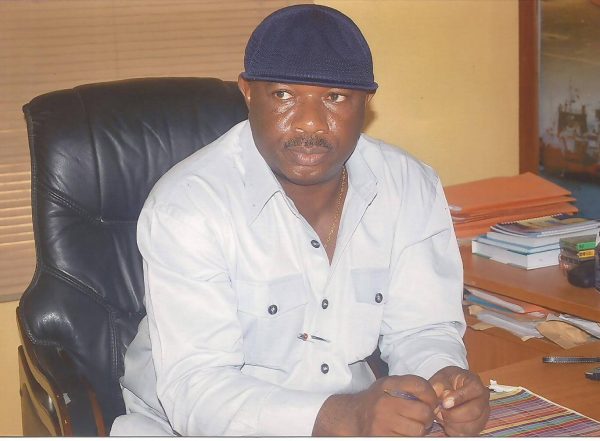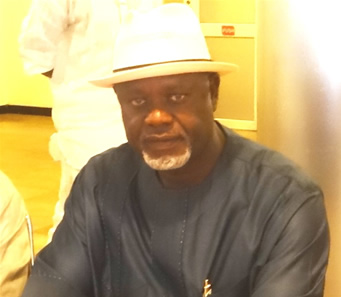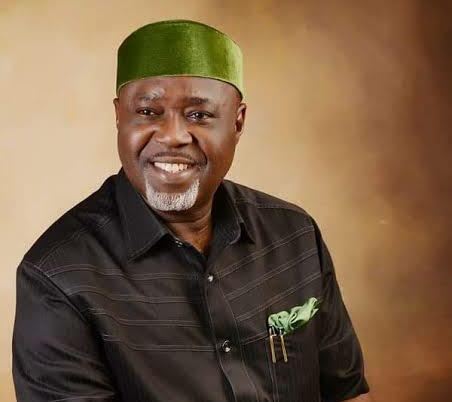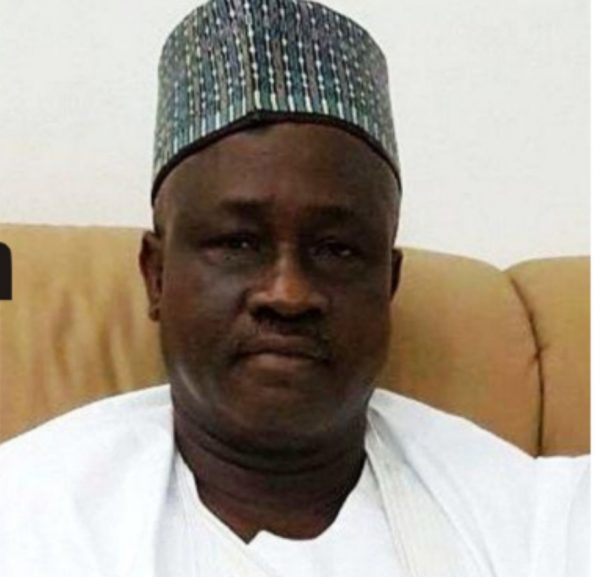Why Agents, Truckers Pay N40,000 To Drop Empty Containers – Anyanwu
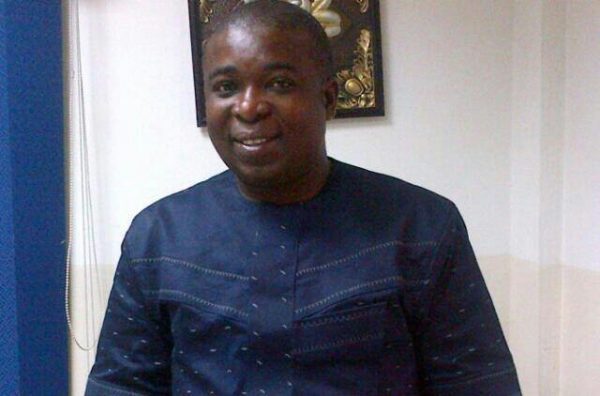
Most of the holding bays have loaded empty containers up to the maximum capacity so they can’t absorb more containers. The problem led to trucks laden with empty containers parking on the roads.
We have trucks lined up on Oshodi-Apapa road, Ago Palace road, Lagos-Badagry expressway, Orile-Costain road, Old Ojo road, among others, as a result of the directive by Nigerian Ports Authority (NPA) that all empty containers should be kept at holding bays.
In the past when trucks were allowed to drop empty containers at the ports we weren’t having these challenges. This has also increased the cost of operations for the shipping companies and they are putting the cost on the importers from the foreign countries. They are introducing new charges on imports coming into Nigeria to cover the cost for operating holding bays. It is more expensive for them to operate a holding bay because in the past they entered agreement with terminal operators for their empty containers to be at the ports.
Years ago, each of the shipping lines had slots for a number of empty containers to be at the ports but NPA has directed that they take their empties to the holding bays and bring them back to the ports when the ships are ready. The problem is that ships spend two or three days at the ports but it takes seven to ten days to move the empty containers by road from the holding bays to the ports.
Moving containers by barges is the only solution for now and that is what we do for most of our customers like Maersk Line, PIL, among others. However, the movement of empty containers via barges comes with extra cost to the shipping companies.
Some shipping companies are equally moving containers by rail but that the challenge is that the rail doesn’t cut across the major ports. While there is a rail link to Apapa port for instance, there’s none for Tin Can Island Port. For our offdock terminals and empty containers; we move them by barges.
Some experts have argued that shipping companies ought to strike a balance to ensure the volume of empty containers coming into the country also leave with the ships. What’s your take on this?
Of course, it’s important to balance the inflow and outflow of containers; but to do so the empty containers would have to get to the ports on time. A ship is waiting at the ports but the empty container is on the road. While the ship has three days to spend at the port, it would take the truck seven to ten days to get to the port, before the truck gets to the port the ship has sailed.
The ship can’t afford to wait longer because it would have to pay demurrage. The ship is a business venture and the owners have calculated the number of turnaround it should do in a year. They must be able to make their projected income. One of the policies of NPA in the past was that if a ship brings in 200 containers for instance, it should also leave with at least 200 empty containers. The containers are assets to the shipping lines because they need the containers for their businesses. The road isn’t helping matters because everyone needs the empties to leave the country.
The concession agreement between NPA and terminal operators is currently been amended. That agreement has been a major problem over the years with concessionaires lamenting that NPA wasn’t keeping its end of the bargain while other operators lamented that the concessionaires were exploiting the public with frivolous charges. These concerns led to the emergence of a port economic regulatory function given to Nigerian Shippers’ Council (NSC). What are the major areas that need rejigging?
Shippers’ Council is still in court with the shipping lines over this issue and the matter has reached the Supreme Court. However, the Council has been able to establish that the Shipping Lines Agency Charges (SLAC) collected for years, was illegal. They are pushing for a refund but the amount to be refunded is huge and we may end up pushing the shipping lines to withdraw their services from Nigeria if they couldn’t pay. If they withdraw their services, the impact could be detrimental because we don’t have other shipping lines to handle the business efficiently.
On the concession agreement, the amendment is a welcome development but it should be reviewed in good faith to address the challenges. There should be proper framework on who supposed to supervise the concessionaires. Somebody has to ensure that the concessionaires work in line with the mandate of the government. Stakeholders have complained that these companies don’t respond to issues on time, others lament that they are unfriendly and the most popular complaint has been charges. The review is a step in the right direction but politics shouldn’t be brought into it if we intend to get the sector perform better.
In recent times, there have been allegations that operators of holding bays demand as much as N40,000 to drop empty containers in their facilities following the NPA directive which has seen too many empty containers fighting for the minimal space at holding bays. Is this the new practice?
Terminal operators display the names of the shipping lines whose empty containers are allowed entry into the facility. However, you have cases where the truck driver spends days on the road to the holding bay and by the time he gets there the window has been closed to that shipping line. Therefore, the truck wouldn’t be allowed to enter and the alternative is to turn back or wait until the gate is opened for his liner to come in. Nevertheless, Nigerians are impatient and they would try to find a way even if means parting with some money. I can’t say such allegations are true or untrue, but I can imagine the plight of the truck drivers who have spent days on the road without proper rest, food or sleep. Following the difficulty they have encountered to get to the ports, it shouldn’t be surprising that they would be willing to give bribes in order to drop the emptyear containers.
The 2019 Nigerian general elections is around the corner, as a veteran in port operations what does this entail for port business in the country?
At the moment, the forecast for the last quarter of 2018 is still on course. We expect the cargoes to continue to come in but the norm is that big companies who have massive projects slow down on their imports to see how the election pans out. They want to see how the results would be and what happens afterwards before they proceed with their businesses. In 2015, the elections affected the port environment for almost four to five months because nobody was sure that we were going to have a peaceful election. Cargo traffic didn’t pick up, until around September in 2015 and I predict that the same thing may happen in 2019 but for the rest of 2018, it would be business as usual. The two leading candidates from the major parties are out to outdo each other. They have a lot of similarities. They are both Fulanis. One is experienced and the other is highly connected. One has money and the other has government’s machinery. We would see how the elections pans out.
Some stakeholders have posited that the People’s Democratic Party (PDP) candidate, Alhaji Abubakar Atiku would be good omen for the port sector as someone who has investment in the sector and worked in the Nigeria Customs Service for twenty years. Do you share this opinion?
You can’t really peg that as a reason to believe he would improve the sector. Atiku is a businessman with diverse interests in several fields. However, as a port man, he may try to see how to develop the operations in the port sector and improve the port infrastructure as well.
Apart from the ports, he has invested in education as he owns one of the best universities in the country, the American University of Nigeria (AUN), in Adamawa State. He is also the co-founder of Intels, an oil servicing business with extensive operations in Nigeria and abroad. He is the founder of Adama Beverages Limited, among other investments.
What are the major problems as well as prospects of the port business for Bollore Africa Logistics in Nigeria?
The road situation is our biggest problem inow Nigeria. It has increased the cost of doing business at the ports. Agents pay more for trucking; they lose time in returning containers and pay more for demurrage. All these cost ends up on the prices of goods and services because the importers must make profit at the end of the day.
If the government could tackle the issue of bad port access roads and finish it on time, the sector would overcome the problems. We know that some contractors have been given the contract to fix the roads but the government must be firm on the timelines. There has to be free flow of transport because businesses suffer while the contractors hardly show the urgency that the road deserves.
It is unfortunate that the masterplan for the Apapa port didn’t consider future prospects. It didn’t consider that in the next ten or twenty years the volume of activities at the ports would have increased significantly. The roads should have been constructed with the future in mind. There should have been provision for road expansion following increased activities at the ports. All those tank farms in Apapa are occupying space that could easily have been used to expand the roads but the government weren’t futuristic in the initial plans and they aren’t showing any signs that they have learnt from that mistake. There should also have been plans to expand the ports. Tin Can Island Port for instance, has reached a point were it can’t be stretched further.
Residents around the port area and neighbouring cities are suffering from this problem. People find it very difficult to go about their businesses because of traffic-jam. I leave my house by 5am every morning in order to get to work before 8am. If I leave the house by 7am, I wouldn’t get to the office before 10am. Going home is also another burden because I spend three or four hours on the road. To get out of the port area alone is a major problem. This has created a lot of bottlenecks in transportation around these areas and it exposes people to dangers as containers continue to fall off the trucks, motorcycles are been smashed by trucks and all these happen because of the unfortunate situation at the ports.
Several deep seaports are springing up across various states in the country; Ibom, Badagry, Lekki, among others. Is this the solution to the multiple challenges facing port operations in the nation?
Badagry deep seaport has immense potentials but, how does one go to Lekki by road? Lekki also has no railway. The sponsors of that project must provide the roads and the roads should be developed before the port is ready, otherwise it would be another Apapa traffic disaster. For Badagry; the road is been constructed but it must be completed before the ports so that the traffic situation along that axis isn’t worsened.
Akwa-Ibom is a good location to divert some cargoes away from Lagos ports. However, research should be conducted to find out how many cargoes Akwa-Ibom and the captive market would be able to generate to guarantee the sustainability of that project. Although the markets in Onitsha or Aba could benefit from a deep seaport in Ibom, there are other factors such as the cost, incentives and efficiency. These factors could make or mar the ports in other states and the government must be able to address these issues as well as the security threats in form of militancy and pirates in that region.
Government must be able to give rebate and incentives to get shipping lines call at the ports in Port Harcourt, Delta, Calabar. At least 50% rebate in all port charges would attract these operators to the ports. You don’t expect the shipping companies to incur extra cost of securing their assets just because they want to patronize certain ports. The government should be able to provide adequate security by acquiring gun boats. Shipping companies shouldn’t be burdened with the responsibility of providing personal security because this added cost would be infused in their charges. The Nigerian Navy should be equipped to provide security to escort the vessels to the ports and provide security while the ships discharge cargoes so that pirates don’t attack them.
It is unfortunate that most of the cargoes used in Onitsha are transported via the roads from the Lagos ports. It would have been easier to use ports in Port Harcourt or Delta but the challenges and cost component of using those ports currently outweigh the benefits. If these factors are available the traffic in Lagos would reduce because people would be willing to route their cargoes to those ports. Most of the trucks in Lagos would also move to these states to do their businesses and Lagos ports and the entire state would be more healthy and conducive.
If the road to Lekki is constructed, some people would go through Epe axis and connect the port without necessarily adding to the traffic situation in the state. At Badagry, once the road is completed, most trucks wouldn’t have to come to the Apapa or Tin Can ports area because there would be holding bays and truck parks around that area. With these developments, the overconcentration in Tin Can and Apapa would be eradicated because people could do their port business around Badagry and others could connect Lekki and leave without affecting Lagos metropolis. Everything would become decentralized and the nation would be better for it.
We need people who are technocrats with a vision for the sector and a maritime development masterplan. The National Assembly would have to approve this and the government must prioritize the development of the sector. We need people who are knowledgeable and have the interest of the nation at heart to change this maritime sector. With the right people in the right positions, within four or five years the nation’s port sector could be transformed for good.
Talking about a comprehensive plan for transportation in the country; Nigerian Shippers’ Council is expected to transmute to the National Transport Commission (NTC) in the near future. Is that a step in the right direction for port infrastructural development and planning in the country?
Shippers’ Council emergence as NTC has several prospects but the fact that other players in the industry have refused to accept the port economic regulatory status of the Council shows that there may also be challenges ahead when NSC transmutes to NTC. NPA still claims to be in charge of all regulatory matters at the ports. The recent outcry by the Council that it hasn’t been involved in the ongoing amendment of the concession agreement championed by NPA gives hint that government agencies aren’t working in sync. However, there is need for such inter-agency rapport, sharing of intelligence and ideas if NTC would be able to make impact.
At the moment NPA’s Act is stronger in terms of its roles at the port and we may continue to see that friction between NPA and Shippers’ Council at the detriment of the sector. The NTC Act should give the organization a better framework to operate but the National Assembly would have to pass it and I don’t see that happening in the few months of this present administration.
How long have you been in the maritime industry and what spurred you to pick a career in this sector?
I have been in port business for 24 years. I have witnessed the significant changes from the pre-concession era, the concession and the business environment today. I always wanted to work in the maritime industry because when I was younger my dad took me to see ships and I began to have the desire to work in a ship or around the ports.
After I graduated, I was privileged to get my first job at the ports in 1994. I moved from one level to the other and rose to my position today. I started from the scratch and grew on the rank. I worked in port stevedoring, port operations, the shipping aspect and also container control. Today, I’m into terminal operations and Inland Container Depots (ICD) operations.
How would you describe the changes in the nation’s maritime sector in the last two decades?
The ports are more efficient and safer since the port concession. The ports have also moved closer to the global best standards compared to the archaic facilities and procedures that were used in the past.
In the past we had rifraffs in the ports. People stole things from containers because everyone had access to the port including sensitive areas. Since the emergence of the International Ship and Port Facility Security (ISPS) Code which is an amendment to the Safety of Life at Sea (SOLAS) Code and its enforcement in the nation’s ports, all operators have become safety and security conscious. You find workers wearing the right apparel for safety. Today, dockworkers are properly trained and equipped. Several years ago people worked in the ports barefooted and without helmets. The nation’s ports are more efficient now compared to any time in the past.



